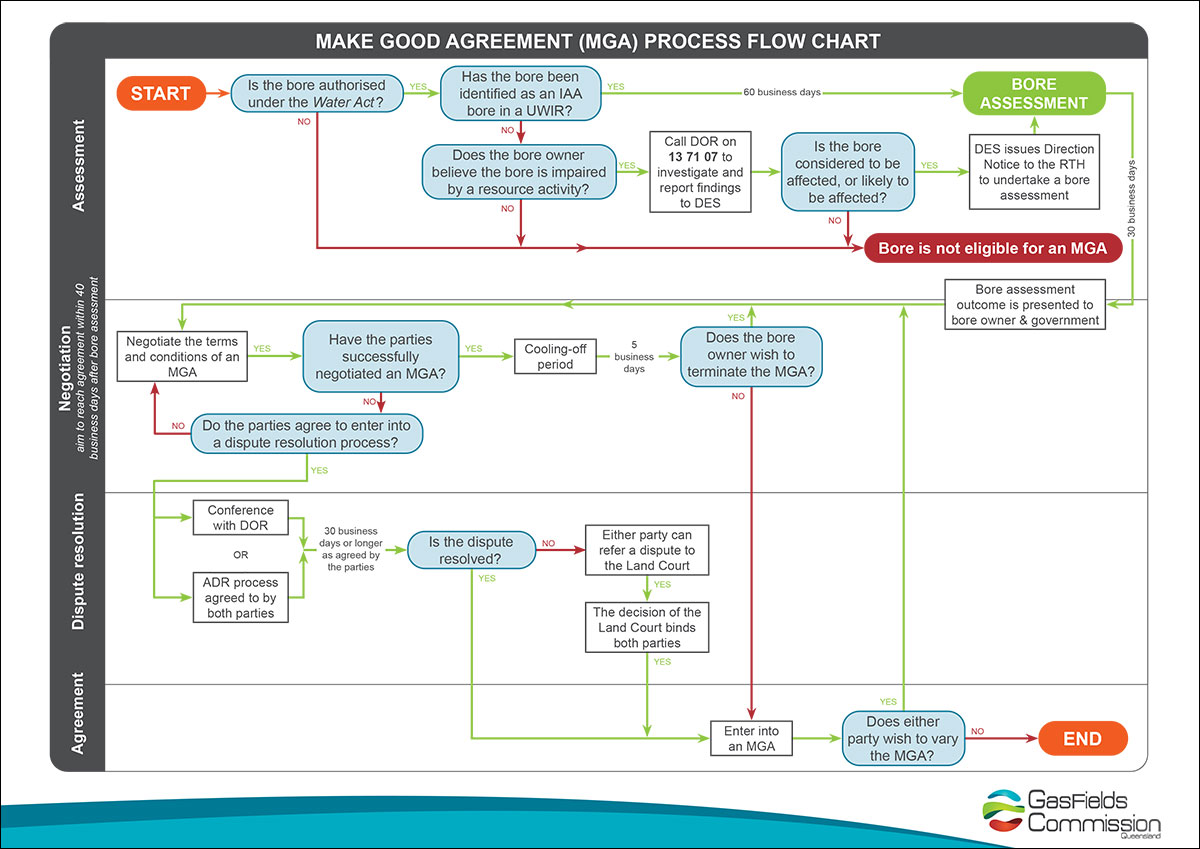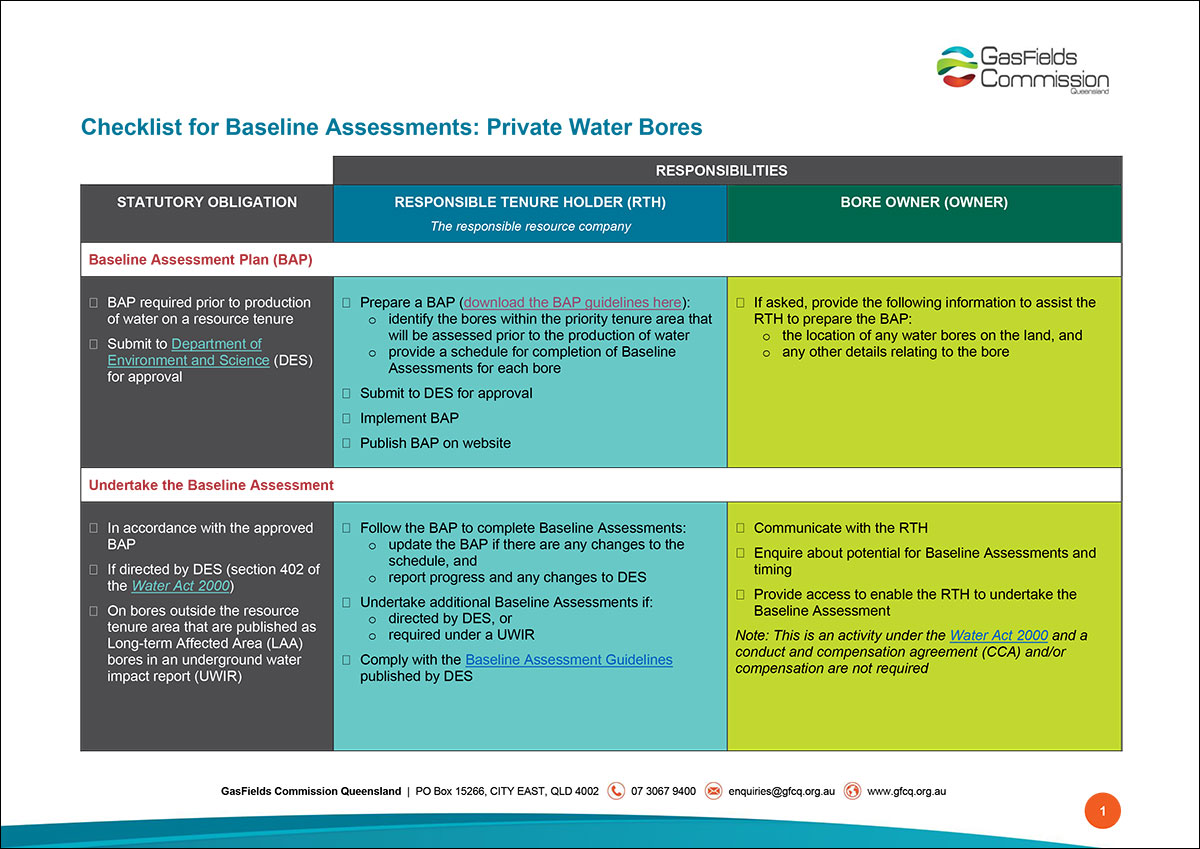Make Good Agreement Process
![]() If a bore owner is concerned their water bore may have been impaired by gas development they should check the ‘predictions of impacts’ for that bore via the bore search tool.
If a bore owner is concerned their water bore may have been impaired by gas development they should check the ‘predictions of impacts’ for that bore via the bore search tool.
![]() If a bore owner is still concerned after checking the bore search tool they should contact the Department of Resources’ Resource Community Infoline for assistance:
If a bore owner is still concerned after checking the bore search tool they should contact the Department of Resources’ Resource Community Infoline for assistance:
- Make an enquiry or complaint online
- Email: resources.info@resources.qld.gov.au
- Phone: 137 107
If a bore impairment was not predicted in an approved underground water impact report (UWIR), the Department of Resources may then forward their investigation findings onto the Department of Environment and Science (DES).
Important considerations for MGAs
- Not all bores are automatically eligible for compensation.
- Make good measures are determined on the basis of impaired capacity.
- In the case where a bore is delivering water but not operating at its paper entitlement, an MGA can be measured against its actual capacity.
- A bore should be in working condition in order to determine impairment if it is to be considered for compensation.
- A bore that is damaged and/or unworkable may hinder the completion of a bore assessment and any entitlement to make good measures.
- A bore assessment will determine the actual capacity of a bore and an MGA will be negotiated on that basis.
- Predictions of impacts to individual water bores within the Surat Cumulative Management Area (Surat CMA) are available via the Office of Groundwater Impact Assessment’s (OGIA) bore search tool.
This MGA Process Flow Chart below outlines the MGA process as per section 418 of the Water Act 2000. Resource companies are required to carry out a bore assessment and enter into an MGA if the bore has been identified as an Immediately Affected Area (IAA) bore in an approved UWIR, or DES has issued a direction notice for that bore.
Impaired Capacity
The assessment of impaired capacity of a water bore with respect to water levels is based on whether the bore is:
- An existing bore – the bore existed prior to the first UWIR relating to the area took effect; or
- A new bore – the bore was constructed after the date above (Note: the first UWIR for the Surat CMA took effect on 18 July 2012).
Existing bores are considered to have an impaired capacity if they can no longer provide reasonable quantity or quality of water for the bores’ authorised use or purpose because of resource company activities.
Impaired capacity for new bores is assessed slightly differently. Water levels in new bores must decline by more than the predicted level for the aquifer accessed by the bore in the most recent UWIR (referred to as the ‘relevant report’ in the Water Act 2000) at the time the new bore was drilled.
This means that the tenure holder is not required to provide make good measures until the actual drawdown (decline) exceeds the impacts predicted in the relevant report.
Landholders intending to drill a new water bore are strongly advised to refer to information in the current UWIR and consider the extent and location of the Long-term Affected Area (LAA) impacts within each aquifer prior to drilling.
Online bore search tool
You can obtain information about the predicted impacts of water extraction for a specific bore within the Surat CMA, and whether the bore is identified as an IAA bore or LAA bore, by entering the bore’s Registration Number (RN) into OGIA’s bore search tool.
![]() Use Queensland Globe to find a bore’s RN, or contact the Department of Resources – Note: you will need the lot number and plan details for your property.
Use Queensland Globe to find a bore’s RN, or contact the Department of Resources – Note: you will need the lot number and plan details for your property.
Baseline Assessment
Before any gas development occurs, a baseline assessment must be undertaken by the resource company. Baseline assessments measure the performance of authorised bores in the area and provide a reference point for subsequent bore assessments.
![]() For more information on each party’s responsibilities when completing a Baseline Assessment, download the Commission’s ‘Checklist for Baseline Assessments‘.
For more information on each party’s responsibilities when completing a Baseline Assessment, download the Commission’s ‘Checklist for Baseline Assessments‘.
Important resources
- Options for Dispute Resolution
- Make Good Agreement Process
- GFCQ Baseline Assessment Checklist
- GFCQ Bore Assessment Checklist
- GFCQ Fact sheet: Make Good Agreements for bore owners
- Underground Water Impact Reports
- FAQs – Make Good Obligations (Department of Environment and Science)
- Make Good Agreements and Quick Guide – Make Good Obligations (Department of Environment and Science)
- Underground water – Baseline Assessment Plans, Baseline Assessment Guidelines, Bore Assessments, Bore Assessment Guidelines (Department of Environment and Science)
- ‘Coal Seam Gas Information for Community and Landholders’ (Department of Environment and Science)
- Current UWIR for the Surat CMA (Office of Groundwater Impact Assessment)
- Other Approved UWIRs (Department of Environment and Science)
- Is your bore predicted to be impacted? (Office of Groundwater Impact Assessment)
- Water Monitoring Information Portal (Queensland Government)


